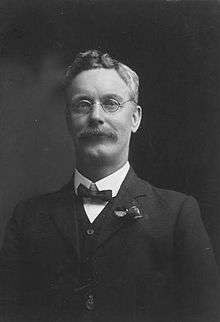William Webster (Australian politician)
| The Honourable William Webster | |
|---|---|
 | |
| Member of the Australian Parliament for Gwydir | |
|
In office 16 December 1903 – 13 December 1919 | |
| Preceded by | George Cruickshank |
| Succeeded by | Lou Cunningham |
| Personal details | |
| Born |
7 June 1860 Everton, Lancashire, England |
| Died |
3 October 1936 (aged 76) Parramatta, Sydney |
| Nationality | English Australian |
| Political party |
Labor (1901–17) Nationalist (1917–19) |
| Spouse(s) | Jane Buckney |
| Occupation | Unionist |
William Webster (7 June 1860 – 3 October 1936) was an Australian politician. Born in Everton, Lancashire in England, he was the son of John Webster, a labourer, and Elizabeth, née Poynton. Leaving school at 13, Webster migrated to New South Wales in 1879 and, having quarried stone at Pyrmont and saved prodigiously, was able to bring the rest of his family to Sydney. By the next year he was financial secretary of the Trades and Labor Council. He married Jane Buckney on 7 June 1883 at Marrickville, and the firm he founded, Webster Bros, was one of the first in New South Wales to observe the standard wage and eight-hour day.
Webster was a member of Marrickville Municipal Council from 1887, and stood for the New South Wales Legislative Assembly seats of Canterbury, Petersham, and Wickham, only to be defeated in all of them. Although he had opposed Federation, he contested the seat of Gwydir in 1901 in an attempt to enter the Australian House of Representatives, but was unsuccessful. However, from 1901 to 1903 he was the first Labor member for Moree in the Legislative Assembly, and as a result of his success was elected to the seat of Gwydir in 1903. He was known for always answering letters and requests from his constituents personally.
His role in the royal commission on postal services was significant, and was in part responsible for the downfall of the Deakin government. On 9 July 1909, as part of these pursuits, Webster delivered a renowned speech lasting 10 hours and 57 minutes, a record which, under new time limits, can never be broken. As a result of this he became known as "the man with the iron jaw". He was Postmaster-General in the first Hughes government, and together with his Prime Minister he left the Labor Party in 1916 over conscription to join the new Nationalist Party of Australia. He retained his place in the government until the 1919 election, at which he was defeated.
Webster retired to Wentworthville and played no further part in politics. He died at Parramatta on 8 October 1936 and was survived by his wife, a daughter and two sons.
References
- Wise, Christine (1990). "Webster, William (1860–1936)". Australian Dictionary of Biography. Canberra: Australian National University. Retrieved 25 August 2007.
| Political offices | ||
|---|---|---|
| Preceded by William Spence |
Postmaster-General 1915–1920 |
Succeeded by George Wise |
| Parliament of Australia | ||
| Preceded by George Cruickshank |
Member for Gwydir 1903–1919 |
Succeeded by Lou Cunningham |